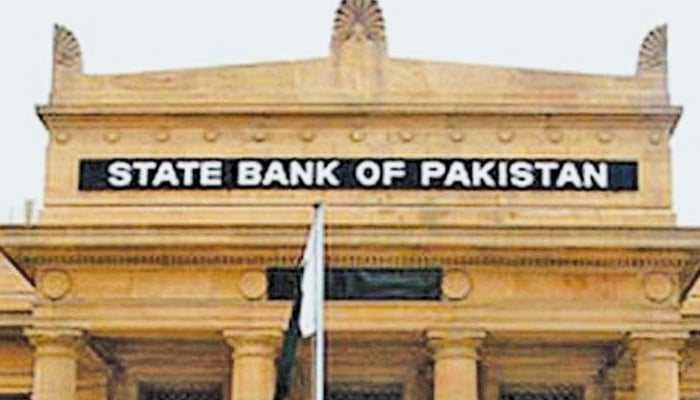SBP tightens rules to check cross-border financial crimes
The central bank has tightened rules for foreign exchange companies to prevent cross-border financial crimes apparently in a move to ensure Pakistan’s compliance with FATF’s standards of anti-money laundering and combating the financing of terrorism.
KARACHI: The central bank has tightened rules for foreign exchange companies to prevent cross-border financial crimes apparently in a move to ensure Pakistan’s compliance with FATF’s standards of anti-money laundering and combating the financing of terrorism.
“Special attention shall be given to the screening of remittances received from or transfer made to high-risk jurisdictions, as identified by Financial Action Task Force (FATF),” the State Bank of Pakistan (SBP) said in a statement late on Thursday.
The SBP said the guidelines are to implement the United Nations Security Council (UNSC) resolutions against money laundering and terrorism financing in an effort to address the concerns raised by the FATF on the country’s failure to control money laundering and detect customers engaged in terrorist financing.
Last week, the FATF team conducted on-site inspection of legal and institutional framework of anti-money laundering and combating the financing of terrorism. The team is likely to submit a fact-finding report to the FATF in January.
Under the guidelines, exchange companies of ‘B’ category are required to ensure meticulous compliance of the statutory and regulatory framework.
Currency exchange houses are also needed to provide services only to individuals designated under UNSC resolutions or proscribed under ATA (Anti-Terrorism Act) 1997, the SBP said.
“Consolidated list of persons proscribed under UNSC Act 1948 and ATA 1997 respectively shall be updated in the company’s information system and should be available throughout the company’s network including franchises/third party payment booths etc,” it added.
“The company’s information system managing the transactions shall be able to screen the designated and proscribed individual on real time basis.”
SBP will periodically check the availability of the updated lists in exchange companies.
Unique identification numbers – computerised national identity cards and passports – available in the UNSC sanction lists and lists of proscribed individuals under ATA 1997 “shall be blocked in company’s information system,” the SBP said.
“Any similarity between the identification information of the customer and that of designated / proscribed entities and persons should be properly investigated for necessary action, as per law, including reporting to the Financial Monitoring Unit.”
Zafar Paracha, secretary general of the Exchange Companies Association of Pakistan said exchange companies of ‘A’ category are already compliant with the UNSC and the SBP’s regulations about money-laundering and terrorism financing.
“Most exchange firms check whether the names of customers are put on the UNSC sanction list while making their transactions,” Paracha said.
“We follow an automated transaction monitoring systems. However, some of the ‘B’ category companies may have weak compliance.”
Exchange companies of ‘B’ category are advised to regularly access the consolidated lists to ensure compliance with measures in line with the UNSC resolutions.
Bankers said the SBP wants to make exchange companies more efficient at identifying financial crime.
Exchange companies may educate their customers that in case of any wrongful or inadvertent freezing, they may apply in writing for de-listing to government through relevant ministry or to the UN’s ombudsperson.
The SBP said internal controls should be strengthened by means of deploying adequate systems for real time screening and allocating sufficient/trained resources to ensure meticulous compliance of targeted financial transactions regime.
The government has already prescribed regulatory up to Rs10 million of penalty on the
exchange companies that fail to detect terrorists and people involved in money-laundering
activities.
-
 King Charles' Andrew Decision Labelled 'long Overdue'
King Charles' Andrew Decision Labelled 'long Overdue' -
 Timothee Chalamet 'forever Indebted' To Fan Over Kind Gesture
Timothee Chalamet 'forever Indebted' To Fan Over Kind Gesture -
 Columbia University Sacks Staff Over Epstein Partner's ‘backdoor’ Admission
Columbia University Sacks Staff Over Epstein Partner's ‘backdoor’ Admission -
 Ozzy Osbourne's Family Struggles Behind Closed Doors
Ozzy Osbourne's Family Struggles Behind Closed Doors -
 Dua Lipa Claims Long-distance Relationship 'never Stops Being Hard'
Dua Lipa Claims Long-distance Relationship 'never Stops Being Hard' -
 BTS Moments Of Taylor Swift's 'Opalite' Music Video Unvieled: See Photos
BTS Moments Of Taylor Swift's 'Opalite' Music Video Unvieled: See Photos -
 Robin Windsor's Death: Kate Beckinsale Says It Was Preventable Tragedy
Robin Windsor's Death: Kate Beckinsale Says It Was Preventable Tragedy -
 Rachel Zoe Shares Update On Her Divorce From Rodger Berman
Rachel Zoe Shares Update On Her Divorce From Rodger Berman -
 Kim Kardashian Officially Takes Major Step In Romance With New Boyfriend Lewis Hamilton
Kim Kardashian Officially Takes Major Step In Romance With New Boyfriend Lewis Hamilton -
 YouTube Tests Limiting ‘All’ Notifications For Inactive Channel Subscribers
YouTube Tests Limiting ‘All’ Notifications For Inactive Channel Subscribers -
 'Isolated And Humiliated' Andrew Sparks New Fears At Palace
'Isolated And Humiliated' Andrew Sparks New Fears At Palace -
 Google Tests Refreshed Live Updates UI Ahead Of Android 17
Google Tests Refreshed Live Updates UI Ahead Of Android 17 -
 Ohio Daycare Worker 'stole $150k In Payroll Scam', Nearly Bankrupting Nursery
Ohio Daycare Worker 'stole $150k In Payroll Scam', Nearly Bankrupting Nursery -
 Michelle Yeoh Gets Honest About 'struggle' Of Asian Representation In Hollywood
Michelle Yeoh Gets Honest About 'struggle' Of Asian Representation In Hollywood -
 Slovak Fugitive Caught At Milano-Cortina Olympics To Watch Hockey
Slovak Fugitive Caught At Milano-Cortina Olympics To Watch Hockey -
 King Charles Receives Exciting News About Reunion With Archie, Lilibet
King Charles Receives Exciting News About Reunion With Archie, Lilibet




